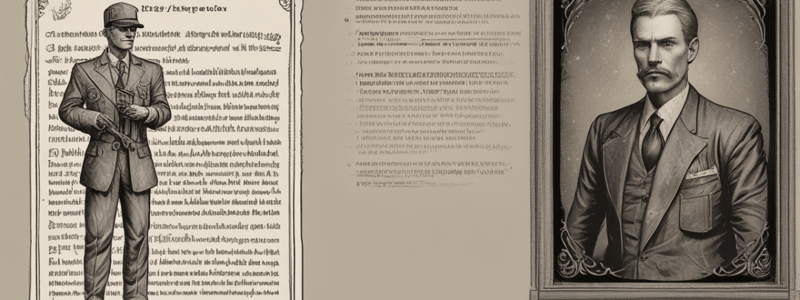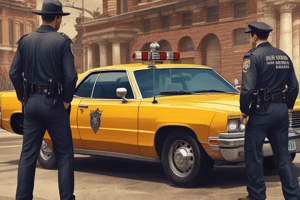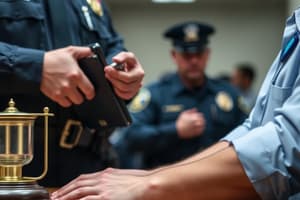Podcast
Questions and Answers
What is the origin of the term 'grand' in 'grand jury'?
What is the origin of the term 'grand' in 'grand jury'?
- It is an abbreviation of 'grandeur' meaning importance
- It is named after a famous French judge
- It is derived from the French word 'grande' meaning large (correct)
- It is a corruption of the Latin word 'grandis'
What is the primary purpose of sending cases to a grand jury?
What is the primary purpose of sending cases to a grand jury?
- To determine the sentence of the defendant
- To allow an independent hearing of the case by a group of the suspect's peers (correct)
- To decide on the charges to be pressed
- To deliberate on the evidence presented
In which cases is a grand jury required?
In which cases is a grand jury required?
- In local jurisdictions, such as the County or State
- In all criminal cases
- In civil cases
- In Federal System, for 'infamous crimes' (correct)
Who prepares the Bill of Indictment?
Who prepares the Bill of Indictment?
What happens if the grand jury finds probable cause?
What happens if the grand jury finds probable cause?
What is the main difference between a warrant and a summons?
What is the main difference between a warrant and a summons?
Who issues warrants and summons?
Who issues warrants and summons?
What is the purpose of an arraignment?
What is the purpose of an arraignment?
What is the role of the grand jury in a felony case?
What is the role of the grand jury in a felony case?
What is a potential outcome if the defendant pleads 'not guilty' at the arraignment?
What is a potential outcome if the defendant pleads 'not guilty' at the arraignment?
What is the purpose of the preliminary hearing?
What is the purpose of the preliminary hearing?
What is an 'Alford plea'?
What is an 'Alford plea'?
What is the purpose of a motion for discovery?
What is the purpose of a motion for discovery?
What is a deposition?
What is a deposition?
What is the purpose of a pretrial motion?
What is the purpose of a pretrial motion?
When can pretrial motions take place?
When can pretrial motions take place?
What is the purpose of a motion to suppress evidence?
What is the purpose of a motion to suppress evidence?
What happens during a suppression hearing?
What happens during a suppression hearing?
Why might the prosecution agree to a plea bargain?
Why might the prosecution agree to a plea bargain?
What is a vestige of the trial by combat system in our current justice system?
What is a vestige of the trial by combat system in our current justice system?
What is the role of the judge in a trial?
What is the role of the judge in a trial?
What is the purpose of plea bargaining?
What is the purpose of plea bargaining?
What is the role of the prosecution in a criminal trial?
What is the role of the prosecution in a criminal trial?
Why might police officers be annoyed by plea bargaining?
Why might police officers be annoyed by plea bargaining?
What is the purpose of the defense's job in a criminal trial?
What is the purpose of the defense's job in a criminal trial?
What is the role of the jury in a jury trial?
What is the role of the jury in a jury trial?
What is the purpose of the suppression hearing?
What is the purpose of the suppression hearing?
What is the meaning of 'Voir Dire' in the context of jury selection?
What is the meaning of 'Voir Dire' in the context of jury selection?
What is the result of a successful motion to suppress evidence?
What is the result of a successful motion to suppress evidence?
What is the role of the defense in a trial?
What is the role of the defense in a trial?
How many members are typically in a jury?
How many members are typically in a jury?
What is the purpose of the opening statement in a trial?
What is the purpose of the opening statement in a trial?
What is the role of the judge in a trial?
What is the role of the judge in a trial?
What is the purpose of cross-examination in a trial?
What is the purpose of cross-examination in a trial?
What is the purpose of an appeal in a trial?
What is the purpose of an appeal in a trial?
What is the burden of proof in a criminal trial?
What is the burden of proof in a criminal trial?
What is the primary goal of the defense attorney during cross-examination?
What is the primary goal of the defense attorney during cross-examination?
What is the purpose of the re-direct examination?
What is the purpose of the re-direct examination?
What is the scope of the testimony set by?
What is the scope of the testimony set by?
What is the purpose of the defense motion for a directed verdict of acquittal?
What is the purpose of the defense motion for a directed verdict of acquittal?
What is the role of the police officer as a witness during the trial?
What is the role of the police officer as a witness during the trial?
What is the purpose of the jury instructions?
What is the purpose of the jury instructions?
What should the police officer avoid doing during cross-examination?
What should the police officer avoid doing during cross-examination?
What is the purpose of the closing arguments?
What is the purpose of the closing arguments?
What happens if the jury is unable to reach a verdict?
What happens if the jury is unable to reach a verdict?
What should the police officer do when responding to questions from the defense attorney?
What should the police officer do when responding to questions from the defense attorney?
Study Notes
Grand Jury and Trial Process
- The grand jury is called "grand" because in French "grande" means large, as opposed to the petit jury, which is the trial jury.
Grand Jury Function
- Cases are sent to the grand jury to allow an independent hearing of the case by a group of the suspect's peers.
- The grand jury's job is to determine if there is probable cause to issue an indictment.
Bill of Indictment
- The grand jury is given a Bill of Indictment to consider, which is written by the prosecutor.
- The Bill of Indictment states the facts of the case and the charges the prosecutor will press if the grand jury agrees that probable cause exists.
Grand Jury Proceedings
- The grand jury calls witnesses and reviews collected evidence.
- If the grand jury finds probable cause, they issue a "true bill" and the indictment is issued.
- If probable cause is not found, they find "no true bill" and the indictment is not issued.
Arrest Warrant and Summons
- A warrant is issued based on the indictment or information.
- A warrant is a court order to take custody of a person to bring them to court to answer a charge.
- A summons is an order from the court to a person to bring themselves to court to answer a charge.
Arraignment
- The arraignment is the first public hearing, where the charges are read to the defendant and they are asked to enter a plea.
- If the defendant pleads guilty, sentencing takes place at this point.
- If the defendant pleads not guilty, the case is scheduled for trial.
Preliminary Hearing
- The preliminary hearing is a hearing held in felony cases to review probable cause.
- The judge reviews the evidence and determines if there is probable cause to bind the defendant over for trial.
- The defendant may waive the preliminary hearing, and the case may be sent to the grand jury instead.
Pretrial Motions
- A motion is a formal request to the judge to make a ruling or take an action.
- There are two major types of motions: motion for discovery and motion to suppress.
- The outcome of the trial hinges on the discovery process.
Motion for Discovery
- Discovery is the process of finding out information known by the other side.
- Discovery includes depositions, interrogatories, and requests for documents and evidence.
- The defense must cooperate with the prosecution's requests for discovery.
Motion to Suppress
- The motion to suppress is made by the defense to have evidence barred from trial.
- The defense argues that the evidence was illegally obtained.
- The judge hears arguments and makes a ruling on the motion.
Plea Bargaining
- Plea bargaining is the process of disposing of a case by offering to plead guilty to a lesser charge.
- The defense offers to plead guilty to a lesser charge to avoid the possibility of a larger penalty.
- Plea bargaining typically occurs after discovery and motions.
Trial
- The trial is a contest of facts, where the prosecution and defense present their cases.
- The judge's role is to administer the court and make rulings on questions of law.
- The jury's role is to decide the facts of the case and deliver a verdict.
Jury Selection
- Jury selection is done through a process called Voir Dire.
- Potential jurors are questioned by the attorneys to determine their eligibility and bias.
- The jury is selected to ensure a fair and impartial trial.
Trial Choreography
- The trial follows a specific sequence of events:
- Opening statements
- Prosecution case
- Defense case
- Closing arguments
- Jury instructions
- Deliberation and verdict
Officer's Involvement
- As an investigator, the officer's role is to collect information to assist in the prosecution of the case.
- As a witness, the officer's role is to accurately report the facts of the case.
- The officer must be prepared to present their information clearly and concisely during direct examination.
- The officer must also be prepared to withstand cross-examination by the defense.
Studying That Suits You
Use AI to generate personalized quizzes and flashcards to suit your learning preferences.
Description
This quiz covers the procedures related to arrest warrants and arraignment in criminal cases, including who issues warrants and summons, and the role of the judge and prosecutor.



